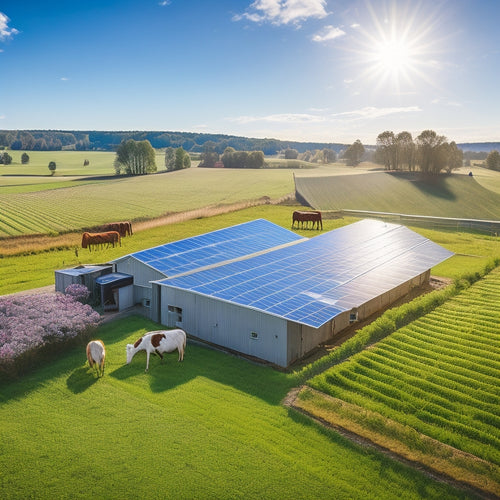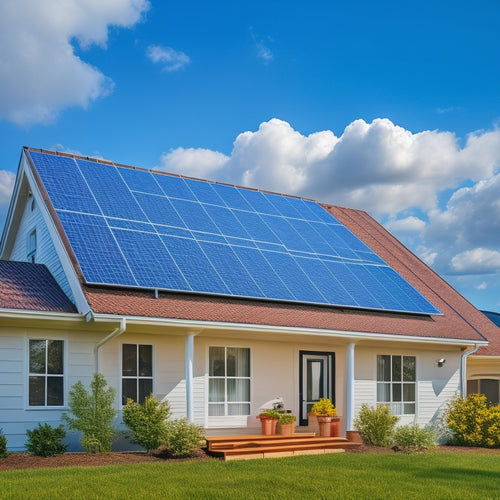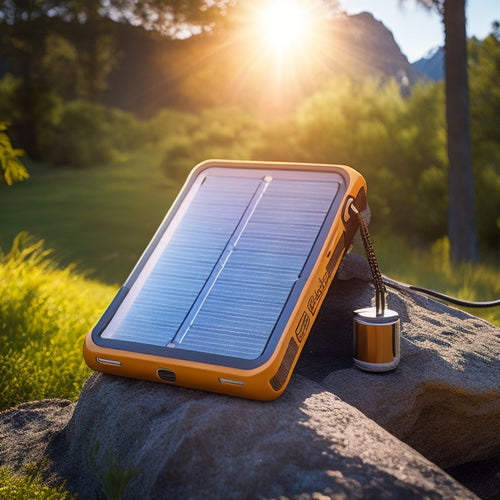
Reliable Home Backup Generators for Uninterrupted Power
Share
When you're considering reliable home backup generators, focus on power output capacity and fuel options to guarantee uninterrupted power during outages. Almost 30% of U.S. households face outages lasting over three hours each year. Prioritize essential appliances and calculate their wattage needs to select the right generator. Fuel types like propane and natural gas offer advantages in efficiency and maintenance. These generators not only enhance safety and emergency preparedness but can also yield long-term savings on energy bills. By evaluating your specific requirements, you can make an informed decision about the best generator for your home and situation.
At a Glance
- Reliable backup generators ensure essential appliances remain operational during power outages, enhancing emergency preparedness and family safety.
- Choosing the right generator involves assessing household power needs and selecting an appropriate fuel type for efficiency and convenience.
- Regular maintenance and routine checks can lower operational costs and prevent costly repairs, ensuring the generator's reliability during outages.
- Investing in a backup generator can lead to long-term savings on energy bills and reduced appliance repairs due to power surges.
- Backup generators can increase property value by enhancing emergency preparedness and appealing to potential buyers in the real estate market.
Cost-Effective Power Solution
When considering a home backup generator, you'll need to weigh the initial investment against potential long-term savings.
While upfront costs can vary markedly based on the system's capacity and features, the return on investment often becomes apparent during extended power outages.
This is especially vital for residents in rural areas, where frequent power outages can last over 24 hours, making reliable backup systems essential.
Initial Investment Considerations
Investing in a home backup generator involves careful financial planning and a clear understanding of your energy needs. Before you make a purchase, consider the total costs associated with the generator, including installation costs. These costs can vary greatly based on generator size, type, and the complexity of the installation.
For instance, a standby generator typically requires a more intricate setup than a portable one, which can influence your budget.
You should also investigate financing options available for your investment. Many companies offer payment plans or financing through third-party lenders, allowing you to manage your expenses more effectively. Evaluating these options can provide you with flexibility in your budget, minimizing the financial burden of upfront costs.
Additionally, think about the long-term benefits of your generator choice. While the initial investment might seem substantial, consider how it can enhance your energy independence and reliability during outages.
Long-Term Savings Potential
Considering the initial investment in a home backup generator, it's important to look beyond upfront costs and evaluate the long-term savings potential. By investing in a reliable generator, you can greatly reduce your dependency on the grid, ultimately lowering your energy bills.
Generators with high energy efficiency ratings convert fuel into electricity more effectively, leading to reduced operational costs over time.
Moreover, the maintenance costs associated with home backup generators are often lower than anticipated. Regular maintenance can extend the lifespan of your unit, allowing you to maximize your investment.
By performing routine checks and adhering to manufacturer guidelines, you can avoid costly repairs and guarantee peak performance.
Additionally, the peace of mind that comes with uninterrupted power can be priceless. You're not just safeguarding your home against outages; you're also protecting your appliances and electronics from potential damage due to power surges.
In the long run, the savings on repairs and replacements can outweigh the initial costs of purchasing a generator.
Therefore, when considering a home backup generator, remember to factor in the long-term savings potential, which can provide you with both financial and emotional freedom.
Enhanced Home Safety Assurance
Having a home backup generator greatly enhances your emergency preparedness, ensuring that essential systems remain operational during power outages.
This reliability not only safeguards your family's comfort and safety but can also increase your property's value in the eyes of prospective buyers.
Additionally, leveraging energy independence through reliable backup solutions contributes to long-term savings and sustainability.
Investing in this technology offers peace of mind, knowing you've taken proactive steps to protect your home and loved ones.
Emergency Preparedness Benefits
Enhancing your home's safety assurance involves incorporating backup generators into your emergency preparedness plan. These generators are essential tools for effective emergency planning, ensuring you maintain power during outages caused by storms, natural disasters, or other unforeseen events.
With a reliable backup generator, you can keep essential systems operational, such as heating, refrigeration, and medical devices, directly impacting your family's safety and well-being.
Moreover, integrating a backup generator into your disaster readiness strategy allows you to remain self-sufficient when the grid goes down. This independence not only reduces the stress associated with power loss but also enhances your peace of mind.
You won't have to worry about food spoilage, heat loss in winter, or medical emergencies exacerbated by outages.
Considering the potential for rising extreme weather events, preparing your home with a backup generator becomes increasingly crucial. In doing so, you're not just planning for the immediate consequences of power loss; you're building a resilient home capable of withstanding various emergencies.
Ultimately, investing in a backup generator is a proactive step towards safeguarding your family and ensuring their safety during unpredictable situations.
Increased Property Value
Investing in a backup generator not only enhances your home's emergency preparedness but also greatly boosts its property value. In today's real estate market, properties that offer reliable power solutions are more appealing to buyers. This enhanced property appeal can considerably drive up market demand, making your home a more attractive option.
Consider the following factors when evaluating how a backup generator influences property value:
| Factor | Impact on Property Value |
|---|---|
| Emergency Preparedness | Higher buyer confidence |
| Energy Independence | Increased appeal in outages |
| Insurance Benefits | Potential premium reductions |
| Resale Value | Greater marketability |
When potential buyers see a backup generator, they perceive your home as a safe haven in unpredictable circumstances. This assurance can lead to quicker sales and even competitive bidding, ultimately allowing you to command a higher price. In an age where reliability is paramount, equipping your home with a backup generator not only safeguards your lifestyle but also serves as a strategic investment in your property's future. Accept the freedom that comes with enhanced safety and increased value.
Key Specifications Overview
When choosing a home backup generator, understanding power output capacity is essential, as it determines how many appliances you can run during an outage.
In addition, fuel type options, such as gasoline, propane, or natural gas, affect both performance and convenience. Evaluating these specifications will help you select a generator that meets your specific energy needs efficiently.
Moreover, considering the impact of government incentives and subsidies can enhance the affordability of your backup power solution.
As advancements in technology continue to evolve, they may also affect your decision on the best generator for your home.
Power Output Capacity
How do you determine the right power output capacity for a home backup generator? First, you need to assess your household's power requirements.
Create a list of essential appliances, including refrigerators, lights, and heating or cooling systems. Each appliance has a specific wattage. By summing these figures, you'll arrive at your total power consumption.
Next, consider starting and running wattages. Some devices, like refrigerators, require more power to start than to run. Factor in these surges to avoid overloading your generator.
In power management, it's critical to choose a generator that can handle not just your current needs but also future additions, ensuring your energy efficiency remains ideal.
A generator with a capacity slightly above your calculated needs provides a buffer for unexpected demands.
Fuel Type Options
Selecting the right power output capacity is only one aspect of choosing a home backup generator; the fuel type you opt for considerably impacts both performance and convenience.
Propane advantages include cleaner combustion and a longer shelf life compared to gasoline, which can degrade over time. However, you'll need adequate fuel storage for propane tanks.
Natural gas considerations revolve around availability—if you have a municipal supply, it's convenient and requires minimal maintenance.
Diesel performance is strong, offering high efficiency and reliability, although it may come with higher emissions impact and maintenance requirements due to engine complexity.
For those seeking versatility, hybrid options that combine fuel sources can provide flexibility, allowing you to switch between fuels based on availability and cost.
Solar integration is another forward-thinking choice, utilizing renewable energy while minimizing reliance on traditional fuels.
When evaluating your options, consider not just the operational aspects but also the emissions impact and environmental considerations of each fuel type.
Assess Your Power Requirements
To effectively assess your power requirements, start by identifying the vital appliances you need during an outage.
It's also beneficial to take into account any home energy storage solutions you might use, such as high energy density batteries, which can help guarantee you have adequate power during emergencies.
Once you've listed these items, calculate their total wattage needs to make certain your backup generator can handle the load.
This process is essential for selecting a generator that meets your specific energy demands.
Determine Essential Appliances
Evaluating your essential appliances is important when assessing your power requirements for a home backup generator. Start by listing your appliance priorities—those necessary devices you rely on during power outages, such as refrigerators, heating systems, and medical equipment.
Understanding which appliances are important helps streamline your power management strategy.
Next, categorize these appliances by their function and significance. Identify those that must remain operational for safety and comfort. For instance, if you have a medical device that requires constant power, it should rank high on your list.
Conversely, less critical appliances, like decorative lighting, can take a backseat in your planning.
Consider the starting and running wattage of each appliance. This knowledge not only informs your choice of generator but also guarantees that you're prepared for any power demands that arise.
Calculate Wattage Needs
Calculating your wattage needs is essential for guaranteeing your backup generator can adequately power your necessary appliances during an outage. Start by conducting a thorough wattage estimation of all devices you plan to run. Each appliance has a specific starting and running wattage, so refer to the manufacturer's label or user manual for precise figures.
Next, prioritize your appliances based on necessity. Identify which devices are imperative—like your refrigerator, heating system, and medical equipment. This appliance prioritization will guide your wattage estimation, guaranteeing you focus on what truly matters during a power loss.
Add the running wattages of your priority appliances together, and include an additional 20-30% buffer to account for surge demands when appliances kick on. This way, you can avoid overloading your generator and guarantee it operates smoothly.
Ultimately, having an accurate wattage calculation allows you the freedom to make informed choices about your generator's capacity, guaranteeing you can maintain essential functions in times of need.
With this knowledge, you can confidently select a generator that meets your power requirements and keeps your home running efficiently during outages.
Longer Runtime Than Competitors
When evaluating home backup generators, one vital factor is their extended power supply duration.
You'll find that models with longer runtimes can keep your essential devices running during outages without frequent refueling.
This capability not only enhances convenience but also guarantees that your household remains operational for extended periods when you need it most.
Extended Power Supply Duration
Many homeowners face the challenge of maintaining power during outages, and having a backup generator with extended runtime can make all the difference. When you invest in a generator that offers longer operational periods than competitors, you're not just gaining convenience; you're enhancing your power management capabilities.
Extended runtime guarantees that you can keep essential appliances running without frequent refueling interruptions, allowing for seamless daily operations even during prolonged outages.
Fuel efficiency plays a critical role in this scenario. Generators that maximize fuel usage can provide extended power supply durations, translating to lower costs and less hassle. You'll find models that integrate advanced technologies, optimizing energy consumption while still providing strong performance.
Moreover, a generator with extended runtime enables you to maintain your lifestyle without compromise. Whether it's keeping the refrigerator running or powering heating and cooling systems, knowing your backup solution can sustain longer periods of operation gives you peace of mind.
In the end, selecting a generator that prioritizes both performance and fuel efficiency will guarantee that you stay connected and comfortable, even when the grid fails.
Choose wisely, and you'll enjoy uninterrupted power when it matters most.
Frequently Asked Questions
How Do I Maintain My Backup Generator for Optimal Performance?
To maintain your generator for peak performance, follow these generator maintenance tips: regularly check oil levels, test battery health, and clean air filters. For troubleshooting common issues, consult the manual and inspect connections for wear.
Can I Use a Generator Indoors for Power Supply?
You shouldn't use a generator indoors due to indoor safety concerns. The generator fumes can be deadly, containing carbon monoxide. Always operate it outside in a well-ventilated area to guarantee your safety and freedom from harm.
What Types of Fuel Do Backup Generators Typically Use?
Backup generators typically use gasoline, diesel, propane, or natural gas. Each fuel type varies in fuel efficiency and generator emissions, affecting your choice based on environmental impact and your need for reliable power during outages.
Are Backup Generators Noisy During Operation?
When it comes to generator noise, it can be a real headache. However, sound insulation techniques can considerably reduce the noise, allowing you to enjoy your freedom without the constant hum of a generator.
How Long Does It Take to Install a Home Backup Generator?
Installing a home backup generator typically takes between 6 to 12 hours, depending on the installation process and generator location. You'll want to verify everything's properly connected and permits are secured for peak performance.
Explore More
To sum up, investing in a reliable home backup generator isn't just about convenience; it's about securing your family's safety and comfort during power outages. You might worry about the initial cost, but consider the long-term savings and peace of mind. With various options customized to your power requirements and enhanced runtime, these generators prove to be a smart, cost-effective solution. Don't wait until the next outage—take control of your power needs today.
Related Posts
-

What Do I Need to Know About Farm Solar Panels
When considering farm solar panels, you need to assess costs, benefits, and technical specifics. Initial investment c...
-

Cost of Solar Panel Installation
You can expect to pay between $15,000 and $30,000 or more for a typical solar panel installation, depending on the sy...
-

Fastest Solar Chargers for Emergency Power
When choosing the fastest solar chargers for emergency power, you need to focus on features like rapid charging capab...


